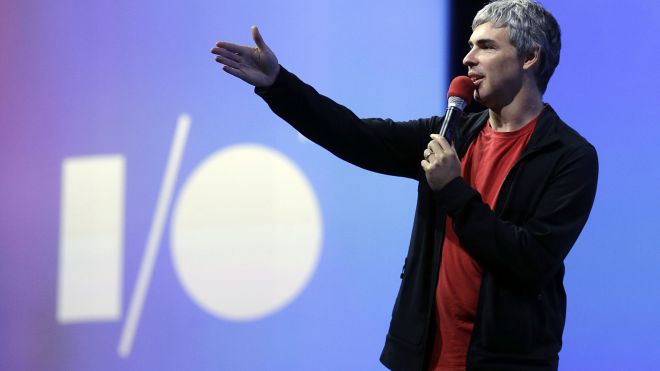
Earlier this week, Google CEO Larry Page finally revealed the reason behind his soft, hoarse-sounding voice: he suffers from a rare condition called vocal cord paralysis
Though Page was able to speak on Wednesday at Google I/O, the company’s annual developer conference, he recently wrote on his Google Plus profile that he has struggled with vocal cord paralysis for the past 14 years.
Page said he was first diagnosed with paralysis in his left vocal cord after a bad cold. However, his condition worsened last summer when his right vocal cord also became paralyzed.
Experiencing paralysis in both vocal cords is extremely uncommon, according to Dr. Nicole Maronian, director of the Voice Center at University Hospitals Case Medical Center in Cleveland, Ohio, who did not treat Page for his condition.
“Since I’ve been in practice, since 1998, it’s been one patient. Having it affect both vocal cords, it’s pretty rare,” Maronian told FoxNews.com.
Normal vocal cords open and then close completely every time they are stimulated by the nerves.
“They have to close in a tight line to get the kind of strong voice out that you and I have today,” Maronian said.
But when vocal cords become paralyzed, they are not able to close completely, leaving a gap. 
“If there’s a gap, air starts leaking through, and you start sounding breathy, softer,” Maronian explained.  
In addition to hoarseness, patients with this paralysis can also experience shortness of breath due to air leaking through the gap between the vocal cords.
“They often get a little bit high-pitched, trying to project or pitch the voice. They get short of breath because of all that air leaking out, or have trouble getting full sentences out because of the air leaking out,” Maronian said.
Some patients even experience aspiration, when recently swallowed fluids leak through the space in between the vocal cords. Aspiration can lead to coughing symptoms or even “aspiration pneumonia, which has significant morbidity and mortality,” Maronian said.
While the paralysis is typically thought to be caused by a viral infection, such as a cold, pneumonia or bronchitis, other factors may be to blame as well.  
“Lots of things can affect the nerve: A virus, compression from a thyroid issue, other things like cancer, (or) surgeries where the nerve is ether stretched or pulled,” Maronian said.
Page disclosed that he was also diagnosed with Hashimoto’s thyroiditis in 2008, an inflammation of the thyroid gland, which may or may not affect his vocal cord paralysis.
“Sometimes the thyroid gets big which can compress the nerve and push on it. Usually though, the gland burns out and gets small and the nerve compression issue isn’t a piece of it anymore,” Maronian said.
Recovery time for vocal cord paralysis can vary. Some patients rebound within months, while others take much longer to heal, Maronian noted. Depending on the needs of the patient, doctors can offer several treatment options for vocal cord paralysis. Patients can wait and see if the condition improves on its own, but many opt for vocal cord injections or surgical procedures to achieve faster relief and recovery.
“In the office or operation room, we can (inject) a material next to the vocal cord that pushes it into a more natural position, so it can get closure. (We then) watch and hope it recovers on its own,” Maronian said.
Page said in his statement that he plans to “fund a significant research program” through the Vocal Health Institute, led by Dr. Steven Zeitels from the Harvard Medical School and the Massachusetts General Hospital Voice Center.
source : http://www.foxnews.com/health/2013/05/16/vocal-cord-paralysis-explaining-google-ceo-larry-pages-rare-condition/